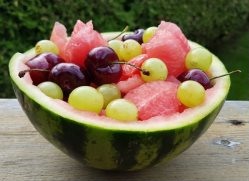Blog Categories
Recent Posts
- Home
- Are Your Kids on a Sugar Overdose?
Are Your Kids on a Sugar Overdose?
Posted by on

Are your kids on a sugar overdose?
If your answer is “No way”, how about we take a quick survey?
Have your children been offered a candy or a cookie at any point in the past week?
(at school, in their day care, at day camp, at their after school activities, at the end of their weekly youth movement meeting, in their Sunday school, in their weekend classes, at the barber’s, hair dresser’s or at their sports club)
Were they offered a cookie by a well-meaning neighbor/friend/family member, for Christmas, Valentine’s Day, or simply on a play date?
And what about that birthday party they went to last weekend?
Did they have a cake? With ice cream? And if I guess correctly, they received a goody bag full of candy?
They also had a juice box or two? (Don’t be fooled by the image on the carton, juice boxes contain a lot of concentrated sugar.)
2, 7
Ready for more?
Here we go.
Have your kids had hot chocolate during your town’s annual winter fun day?
(You know it’s very high in sugar, right?)
What about a freezie after baseball/soccer/swimming class?
Now let’s take a look at school:
Isn’t school supposed to be candy-free?
I would imagine though, that your kids came home with candy canes just before Christmas, and heart-shaped lollipops on Valentine’s Day? Chocolate eggs for Easter? A cupcake on their class mates’ birthdays?
And I won’t even start on Halloween…
I hope you’re with me then, if I conclude that the occasional sugar is not so ‘occasional’. Quite the opposite, it’s actually very frequent.
And here is another point to consider:
Unbeknownst to you, you have probably fed them way more sugar than you think.
Surprised?
Unless you mostly cook at home from scratch, many store-bought, ready-made processed foods contain hidden sugar in various
savory products:
Spaghetti sauces, breads, bagels, crackers, tinned corn, chicken nuggets, hotdogs, pizza, ready-made rice meals, soups, BBQ sauces, smoked ham, smoked turkey breast, ready-made lasagna, and many, many more.
And we haven’t even touched on the sweet products – the flavored yogurts, ice creams, juices and ketchup, to name a few.
I’ll let you do the math.
To make things worse, sugar could appear under so many different names, making it hard to detect on the label:
1b,3b,4a
Cane juice, beet sugar, fruit juice, rice syrup, molasses, anhydrous dextrose, brown sugar, confectioner’s powdered sugar, corn syrup, corn syrup solids, dextrose, fructose, high-fructose corn syrup (HFCS), invert sugar, lactose, malt syrup, maltose, nectars (for example, peach or pear nectar), pancake syrup, raw sugar, sucrose, white granulated sugar, processed honey, processed maple syrup, glucose, galactose, and maltodextrin.
Check out where it appears in the ingredients list, too. The higher up an ingredient is on the list, the more of it is included in a product. 4a
Now let’s examine a product that is misleadingly marketed as healthy: the breakfast cereal. 6
Most breakfast cereals are high in sugar and refined grains (empty calories).
The small amounts of whole grains they contain do not make these products healthy, or negate the harmful effects of the other ingredients.
6
Starting the day with a high-sugar breakfast cereal will spike your blood sugar and insulin levels.
A few hours later, your blood sugar may crash,
6,8 and your body will crave another high-carb meal or snack, thus creating a vicious cycle of overeating.6
Without getting too technical, most sugar, as we know it today, is highly processed and refined,
8 which makes it very concentrated.
The human body cannot tolerate a large amount of refined carbohydrates. The vital organs in the body are actually damaged by this gross intake of sugar.
3b, 8
These empty and quickly digested calories actually pull minerals from the body during digestion.
3b
Also, excess sugar can create an addictive response in our brains which makes us crave it more.
1a,3b,8,9
It will thus not very likely disappear by itself.
I wish I could tell you that you shouldn’t worry, but unfortunately, all this unnecessary extra sugar takes its toll on our childrens’ health.
Luckily, the short term impact is usually only temporary.
Do any of the following sound familiar?
- The child is ‘freaking out’ or becoming jittery, as if he or she is not in control. (And I trust you can tell the difference between ‘happily playful’, and ‘freaking out’)
- Having trouble focusing
- Crankiness
- Having trouble falling asleep
But even more disturbing are the long term detrimental effects to their health, 1a, 4a with the increased chance of various health problems and diseases (many of which are at least partly preventable), including: diabetes, heart disease, cancer, obesity, worsening of existing ADHD, hyperactivity, migraines, food allergies, tooth decay, gum disease, yeast infections, suppression of immune system, increasing risk of contracting infectious diseases, weaker eyesight, DNA structure impairment, skin aging, hormonal imbalances, and premature aging.1a,1b, 3a,4a

Studies show that in the U.S., diabetes rates have increased 900 percent since the early 1960s, and it’s now affecting people at an increasingly younger age. 1b
Parents, let’s all get on board, and stop flooding our children with sugar.
Our youngsters need high quality nutritious food to grow, not empty and unhealthy calories.
You know the expression ‘well fed but poorly nourished’?
It means that filling up on empty calories won’t cut it. The quality of your food matters a great deal.
A little more on that:
If a child fills up on candy and cookies, they won’t be very hungry for the real meal. That creates a loop of snacking on sugary treats (empty calories) instead of eating healthy food.
In the meantime their body is not getting the vital nutrients it needs for proper functioning, and over time is slowly ‘depleted’.
Is it really a surprise some children get sick often?
As a rule, if your children ate well during the meal, they shouldn’t be hungry afterwards.
However, if they are still hungry at the end of the meal (or shortly thereafter), and are therefore looking for a sugary snack, take it as a sign that he or she did not eat enough during the meal, or perhaps something more fundamental was missing from the meal.
The small treat after lunch should be just that – a small treat. It should not replace the actual food.
In other words, if your child generally has small meals and big desserts (or big sugary snacks), you might want to reverse the order…

And here comes a part that might be harder to swallow:
Your children’s sugar consumption is not entirely separate from yours.
Your children see what you eat, and learn about food choices from your example.
And whereas you have no control over what is offered to them outside of the house, you sure do have a say over what you eat at home.
Think about it.
I am often asked how we handle sugar consumption in our family.
I will gladly share, just remember that this is not medical or nutritional advice. This is just how it works for us. I am neither a health expert nor a nutritionist.
Here are the most frequent questions, together with my answers:
- Q: How do you prevent your kids bingeing on candy, Nutella, sodas, etc.?
A: We simply don’t have sodas and Nutellas at home, so the temptation isn’t there. We don’t buy candy either.
As for Halloween candy:
We sort through their bags right away.
Whatever we decide to keep, we store in a high cupboard in the kitchen, out of their reach, (never in their rooms!), so that we can monitor their intake.We also have strict rules about sugar consumption which I will touch on later.
- Q: Do your children crave sugar sometimes?
A: Hardly ever.
The less you consume it, the less you crave it. Key concept!
So we simply keep their sugar consumption below the ‘craving threshold’, my terminology.
Don’t get me wrong, kids being kids, they’d gladly take candy if offered, but they rarely go looking for it.
- Q: Do your kids throw a fit at the grocery store if they’re not allowed candy or pop drinks?
A: Not at all.
They are used to our rules, and don’t even bother going to the candy aisle.
It’s a joy observing their food choices. Some of their favorite foods are fresh raspberries, olives, dill pickles, and cherry tomatoes.
We also teach them to read the ingredient lists.
- Q: Do you eat cereals for breakfast?
A: No.
Store-bought cereal is very rare in our house, and would be considered a dessert, not a breakfast.
- Q: What do your kids typically have for breakfast?
A: First off, their breakfast is not always sweet.
- A savory breakfast could be a cheese bagel with organic butter and cream cheese, toast with organic fried egg, etc.
- A sweet breakfast would be a toast with organic butter and a little smidge of pure raw honey, or unsweetened oat porridge made with milk and some raisins.
- For a drink we make them homemade hot chocolate, with organic raw cocoa powder, organic milk, organic cream, and a bit of raw honey as a sweetener.
- Q: What do your kids typically drink at home?
A: Mostly water.
They love organic milk too.
We sometimes squeeze oranges into a juice (with the pulp!) as a treat.
We rarely buy juices, sodas, or pop drinks.
- Q: Do you ever go out to restaurants?
A: Yes, but not very often. We keep it for special occasions.
- Q: Do you have a daily sugar allowance?
A: Yes, and it’s all about balance.
Overall, we allow one small sugary treat a day: a cookie, a small candy, a small juice box, etc.
Thus, we’re not completely restricting the ‘fun’, but controlling the intake.
If they have exceeded the daily allowance, say, they were offered a cookie by a friend, but they had already had their dessert that day, or if we go to a restaurant and they have a big dessert and a soda, then the day or two afterwards will be ‘no-sugar days’, where they are not allowed any candy/cookie/sugary dessert, to simply help their bodies get back to balance from the excess of the previous day.
On ‘no-sugar days’ they’re welcome to have fresh fruit, unsweetened crackers, etc. instead of sugary snacks, so it’s not about making them eat less, but about replacing the sugar with a healthier option.
- Q: Do you ever eat desserts at home?
A: Absolutely! But we usually make our own desserts, and they’re very often fruit based.
Sugar is very rarely added, if ever.
We often make fresh fruit salad, or homemade fresh fruit jello. Devour-worthy!
(See link to fruit-based treats at the end of this post) - Q: How do you sweeten your desserts if you don’t use sugar?
A:
- We squeeze an orange on top of a fruit salad, as a natural sweet sauce.
- Mashed bananas are used in some desserts, such as puddings and ice creams.
- If we need an actual sweetener, we use a little bit of stevia. (a natural sweetener from the stevia plant)
We’ve tried several different stevia brands over the years, and all seem to work for us so far.
If you’re considering buying some, you should know that normally, other compounds are added to the stevia, so read the label carefully and look up the ingredients, so that you know what you’re getting.
We don’t use artificial sweeteners, not just because of the funny aftertaste and risk of tummy upset if consumed in large amounts. I simply don’t trust them.
- Q: Do you allow ketchup at home?
A: Very little.
There are many other yummy ways to enhance the flavor of food. No need to sweeten savory food like a dessert.
The kids love salt, pepper, vinegar, freshly squeezed lemon, olive oil, mustard, shredded cheese, parmesan, fresh dill, hummus spread, herbs and spices.
You see, there are plenty of flavors out there!
- Q: Do you limit fruit too?
A: No.
Our children are free to have as much FRESH fruit as they like, and indeed we make sure our kitchen counter and fridge are always abundant with fresh fruit of all kinds.
Fresh fruit is a wholesome food, a powerhouse of life force, Mother Nature’s sweet treat, which among other wonderful nutrients, vitamins, enzymes, and fiber, contains NATURAL sugar, which is much ‘friendlier’ towards your body 3b,7 -if I may use my own phrasing- and not as concentrated as refined processed sugar.
Of course, the principle of ‘All in moderation’ always applies, but if you forgot and went overboard, the belly ache would surely remind you…
Another point about fruit:
Although it’s non-scientific, think about the following point:
If a child generally finds fresh fruit “not sweet enough”, for me that would raise a red flag, especially if the fruit actually is VERY sweet (and very ripe).
I would think he or she is probably used to a much higher dose of concentrated sugar.
My thoughts.

Here are a few other practical tips:
- Introduce fresh fruit as a healthy alternative snack, both at home and whenever you’re asked to bring a snack to school.
Make fresh fruit attractive and available, for example, prepare a tray with bite-size fruit snacks available on the counter. This is a tried-and-true playdate snack too! (The other day, my kids and their friends chugged a whole tray of fresh strawberries on a playdate in our house!)
Works great with veggies too – baby carrots, cherry tomatoes, celery sticks, etc.
- Party bags:
Go for small toys and stickers, rather than candy.
- Valentine’s day:
Decorated cards, heart-shaped erasers, etc. would easily replace candy.
Your local Dollar store will provide you with tons of ideas.
- Teach your kids to limit the amount of sugary treats they accept if offered.
(Our rule of thumb is ‘one in each hand’ for small treats, and only one for anything bigger) - Cook more from scratch at home, where you are in control over the ingredients
- If you’re you an instructor, a teacher, or a youth group volunteer, and you’re looking to treat your youth to something fun at the end of a meeting:
How about a non-food perk? Small toys, balloons, pencils, erasers, stickers, cards, whoopee cushions? (Yeah, try those!)
If you absolutely must provide a food reward, can it be a without sugar? Grapes? Apples? Chips? Pretzels? - Teaching your kids how to bake?
Try bread and buns instead of cookies and cupcakes. - Were your children invited to a party?
Feed them before they go, to curb their need to overdose on snacks
Sugar consumption cannot be separated from a much larger topic – healthy diet, which in itself is part of an even wider subject – healthy life style.
Eating high-quality, nutrient-dense, nourishing whole foods, is key to one’s good health and well-being, and it’s a huge topic all on its own, which I cannot possibly cover in the scope of this post. Nor do I have the required knowledge.
What I do know, is that no child deserves to suffer from frequent sickness and tooth decay, or miss out on school days for sickness, and therefore get behind in their studies or fail their exams.
All children deserve to stay healthy regardless of the season, be energized with the right fuel, be happy and peaceful from within, find it easy to concentrate, and therefore do well at school.
We shouldn’t underestimate the power of both healthy and unhealthy food choices.
All children deserve to eat nutritious foods that supports them (rather than harm them), so that both their minds and bodies are free of strains.
This is not a dream. This is a wakeup call.
Let’s not compromise our children’s’ health on the altar of sugar.
Although it’s easier said than done, one step at a time should make it doable, and it’s worth it.

As promised, here is the link to fun fruit-based treats
Wishing you and your children a wonderful weekend, full of joy and good health,
Didi
Wise Choice Market
Disclaimer:
This article represents its author’s opinion, and is not to be taken as a medical, nutritional, or professional advice.
Images:
1. https://img.clipartfest.com/09b48c08609ae75f7ab101fb269cb33f_cartoon-boy-eating-lollypop-boy-eating-candy-clipart_1283-1300.jpeg
2. https://pregnancywellnesstips.com/wp-content/uploads/2015/11/Stop-Diabetes.jpg
3. https://2.bp.blogspot.com/_UJjEMs882ag/TRfM-gr3KLI/AAAAAAAABMg/v3_EdPOlyPo/s1600/0060-0911-0909-3152_Boy_Eating_Cookies_Out_Of_A_Cookie_Jar_clipart_image.jpg
4. https://st2.depositphotos.com/1007989/5894/i/950/depositphotos_58948505-stock-photo-smiley-eating-an-apple.jpg
References:
1. Dr. Mercola
http://www.mercola.com
- 1a. The Truth about Sugar Addiction
http://articles.mercola.com/sugar-addiction.aspx">http://articles.mercola.com/sugar-addiction.aspx - 1b. Why Cutting Down on Sugar Might Be the Best Health Insurance Available
http://articles.mercola.com/sites/articles/archive/2016/04/23/cut-down-sugar-consumption.aspx - 1c. Sugar Substitutes—What’s Safe and What’s Not
http://articles.mercola.com/sites/articles/archive/2013/10/07/sugar-substitutes.aspx
2. World Health Organization: WHO calls on countries to reduce sugars intake among adults and children
http://www.who.int/mediacentre/news/releases/2015/sugar-guideline/en/
3. Wellness Mama
- 3a. Stop the Sugar Madness
https://wellnessmama.com/podcast/stop-sugar-madness/ - 3b. The Harmful Effects of Sugar
https://wellnessmama.com/15/harmful-effects-of-sugar/
4. Dr. Axe
- 4a. Is Sugar Bad for You? Here’s How It Destroys Your Body
https://draxe.com/is-sugar-bad-for-you/ - 4b. 5 Best Sugar Substitutes
https://draxe.com/sugar-substitutes/
5. https://en.wikipedia.org/wiki/Stevia
6. Breakfast Cereals: Healthy or Unhealthy?
https://authoritynutrition.com/are-breakfast-cereals-healthy/
7. Sugar Content in Fruit Drinks, Juices Too High for Kids
http://www.techtimes.com/articles/144099/20160325/sugar-content-in-fruit-drinks-juices-too-high-for-kids.htm
8. The Harmful Effects of Sugar on Mind and Body
http://rense.com/general45/sguar.htm
9. Daily bingeing on sugar repeatedly releases dopamine in the accumbens shell
http://www.sciencedirect.com/science/article/pii/S0306452205004288


 Loading... Please wait...
Loading... Please wait...













